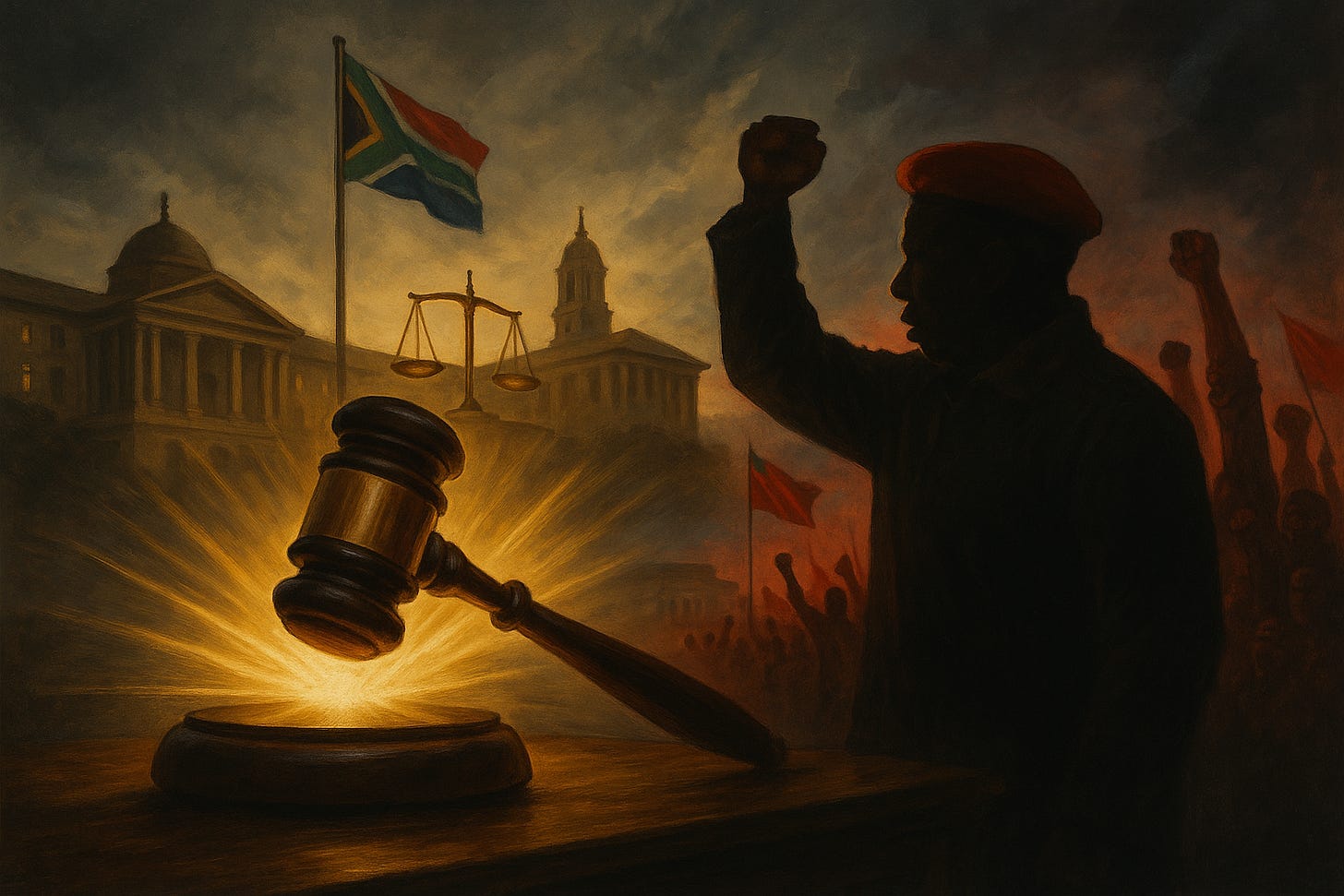Malema’s Firearm Case Ruling Is A Victory For The Rule Of Law
There can be no real freedom in a society where politicians become the law itself and answer to no one.
On the 1st of October Julius Malema, the leader of the Economic Freedom Fighters (EFF), was found guilty by the East London’s Magistrate’s court in relation to his discharge firearm case that dates to 2018.
The court found that Malema, who recklessly fired a gun in the air during a party rally, was guilty of unlawfully possessing a firearm, unlawfully possessing ammunition, discharging a firearm in a built-up area, and endangering the lives of people and their properties.
I welcomed this ruling because it was a reminder that even in a country where the judicial system has arguably been compromised by political interference at the highest levels, the rule of law can still prevail without fear or favour in its lower divisions.
It was a reminder that the laws of South Africa can and should apply equally to all, and that politicians like Malema should not be given a free pass because of the positions that they occupy in society.
Unsurprisingly, Malema and his army of supporters have not accepted the ruling, arguing that it was politically motivated and part of some broader and sinister agenda to silence him for his political views. As he addressed his supporters outside the court after the verdict was delivered, Malema portrayed himself as some victim who is being targeted for purely partisan reasons.
This narrative is patently false, and it exposes how political elites secretly believe that the laws of a country should not apply equally to everyone and that they should be shielded from accountability for wrongdoing.
Closely linked to it is the populist notion that the judicial system (which isn’t democratic by design) should permit them to do almost anything because they are the “true representatives of the masses”. In this regard, the judicial system is attacked whenever it doesn’t allow them to do and say as they wish.
The reality is that Malema is not the victim of some grand conspiracy to silence him. The ruling was informed by clear video footage of him firing a gun into the air during the rally. It was further informed by ballistic evidence that clearly demonstrates that a real firearm – and not a toy gun as he insisted – was used in the reckless stunt.
Beyond any reasonable doubt it is a clear case of wrongdoing.
Malema’s problem is that he belongs to a political elite that has long secretly believed that the laws of the country should not apply to it. It is an arrogant clique that is convinced it deserves special treatment because it sees itself as being above the law. While ordinary citizens must face consequences for breaking it, this clique must be excused for corruption and other crimes such as this firearm incident.
His other problem is that he believes the courts should allow him to do and say as he pleases because they have not elected him. The “masses of the people” have, and therefore their will must go unquestioned. Just as the highest court in the country allows him to incite violence against minorities in the name of free expression, other courts must permit him to behave recklessly with a firearm.
He must essentially be only accountable to a mob that worships and obeys him without question. The judicial system has no authority to hold him to account because it does not embody the “will of the masses”.
This illiberal, populist thinking is deeply troubling and revealing of the kind of society that the EFF would usher South Africa into were it to, by some chance, assume power. At best, the country would become a parliamentary democracy where the law would play second fiddle to the whims of Malema and his inner circle. At worst, it would slide into an outright dictatorship, where absolute power would be wielded by one man.
In both scenarios, the common thread would be the complete subversion of the law and the elevation of Malema and his comrades to the level of demigods with unfettered authority. We would find ourselves in a world where they would become a law unto themselves.
The judiciary is no sacred institution, and is prone to capture through political interference. However, it still has a crucial role to play in safeguarding freedom by upholding the rule of law and protecting the natural rights of individuals.
There can be no real freedom in a society where politicians become the law itself and answer to no one.
South Africa’s judiciary has its own fair share of challenges, but this ruling should, at the very least, be welcomed because it affirms the supremacy of the law and the principle that no one should be above it.
We can acknowledge this without harbouring any illusions.
Ayanda Sakhile Zulu holds a BSocSci in Political Studies from the University of Pretoria and is an intern at the Free Market Foundation.





I fully agree. I need the justice system to also deal with President Ramaphosa (Phala phala) and Jacob Zuma. All 3 should be in prison.